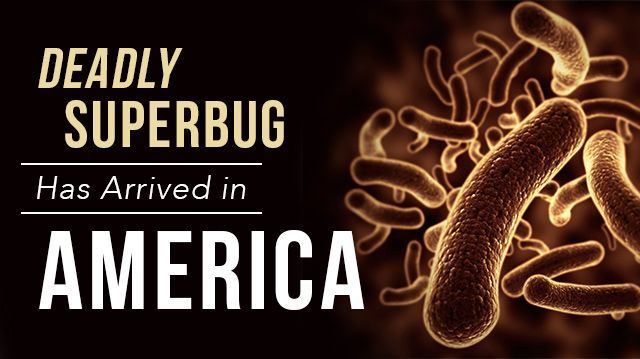
A long-dreaded superbug hits the United States, igniting fears that we may be reaching the end of the road with antibiotics. Meanwhile, the medical community is scrambling to find out how the antibiotic-resistant bacteria CRE was contracted and if it will spread.
Nightmare bacteria
A particularly dangerous superbug, dubbed a “nightmare bacteria” by scientists, is on the rise in the United States. This superbug strain belongs to the family of bacteria known as CRE (carbapenem-resistant Enterobacteriaceae). What is particularly alarming is that these germs often are resistant to antibiotics, according to the Centers for Disease Control and Prevention (CDC). This one deadly bug could kill half of patients who become infected.
Last month, the antibiotic-resistant strain was found in the urine of a 49-year-old Pennsylvania woman treated in an outpatient military treatment facility in that state. Defense Department researchers believe that the woman carried a strain of E. coli resistant to the antibiotic colistin, reports a study in Antimicrobial Agents and Chemotherapy, a publication of the American Society for Microbiology.
Why is CRE resistant to antibiotics?
Normally, seven types of antibiotics treat E. coli. Colistin is a “last-resort” antibiotic used with patients who have multidrug resistant infections, including CRE. Yet this particular strain of E. coli is resistant to all antibiotics. It was barely a year ago that scientists in China first reported that the mcr-1 gene in bacteria was colistin-resistant, according to the Department of Defense.
Currently, medical professionals don’t know why or how this particular strain of E. coli became resistant. However, according CNN’s Dr. Sanjay Gupta, it may have happened because of an overuse of antibiotics in which, “the bacteria become smart, and they develop a resistance.” At other times, suggests Dr. Gupta, “they may spontaneously mutate.” If the patient did develop the mutation spontaneously, it could then spread throughout her body.
In a 2015, CDC Director Dr. Thomas Friedman made a pledge that the government agency is committed to fighting antibiotic resistance. As a start, Dr. Friedman told patients to ask their healthcare providers if antibiotics were truly needed to fight their ailment.
Limit the spread of resistance
Antibiotics are extremely important in reducing the impact of infectious diseases. Yet as resistant bacteria develop and spread the effectiveness of antibiotic treatment declines, posing a very serious threat to public health. Antibiotic resistance has become a growing problem in the United States. The World Health Organization (WHO) warns that it is one of the biggest threats to global health today.
Misuse and overuse of antibiotics is one of the main reasons resistance is spreading. But there are steps you can take to reduce the impact and limit the spread of resistance, suggests the WHO.
- Only use antibiotics when prescribed by a certified health professional
- Always take the full prescription
Meanwhile the WHO encourages healthcare professionals and pharmacists to only prescribe and dispense antibiotics when they are truly needed.
What about natural antibiotics?
“Misuse and overuse of antibiotics have steadily pressured bacteria to develop resistance to several classes of drugs, rendering them ineffective,” says Dr. Andrew Weil. Because of this, Dr. Weil recommends limiting antibiotics to serious bacterial infections and never to use them for viral infections.
For less serious infections, try alternatives to antibiotics drugs first, including rest and botanical remedies, suggests Dr. Weil.
- Garlic has been used effectively to fight off all sorts of bacteria, viruses and infections, according to studies. In fact, it’s one of the most researched and best-selling herbal products on the market. Crushed raw garlic makes a chemical called allicin, a compound that gives garlic its strong odor and is also partly responsible for its germ-fighting and health-promoting properties.
- Horseradish, another botanical alternative, is used to treat urinary tract infections, kidney stones, fluid retention, cough and bronchitis, according to WebMD.
- Honey has been used for microbial infections since ancient times and recently has been “rediscovered” by the medical profession, according to a study published in the U.S. National Library of Medicine.
- Virgin coconut oil has also been shown to have antimicrobial activity, according to research. In fact, the antiviral, antibacterial, and antifungal properties of the medium-chain fatty acids found in coconut oil have been known to fight bacteria, yeast, fungi and certain viruses.
Scientists and public health officials had long warned that if the resistant bacteria spreads, treatment options would be seriously limited. While natural, whole foods with antibacterial properties may not provide an entire remedy, they can certainly be used as the first line of defense against seasonal ailments, perhaps limiting the use of antibiotics.
— Katherine Marko
Sources:
https://www.washingtonpost.com/news/to-your-health/wp/2016/05/26/the-superbug-that-doctors-have-been-dreading-just-reached-the-u-s
http://aac.asm.org/content/early/2016/05/25/AAC.01103-16.full.pdf+html
http://www.cdc.gov/hai/organisms/cre/cre-patientFAQ.html
http://science.dodlive.mil/2016/05/26/proactive-efforts-by-u-s-federal-agencies-enable-early-detection-of-new-antibiotic-resistance
http://www.cnn.com/2016/05/26/health/first-superbug-cre-case-in-us
http://www.who.int/mediacentre/factsheets/antibiotic-resistance/en
http://www.drweilblog.com/home/2013/7/1/alarming-news-about-antibiotics.html
https://nccih.nih.gov/health/garlic/ataglance.htm
http://www.webmd.com/vitamins-supplements/ingredientmono-257-horseradish.aspx?activeingredientid=257&activeingredientname=horseradish
http://www.ncbi.nlm.nih.gov/pubmed/24328700

